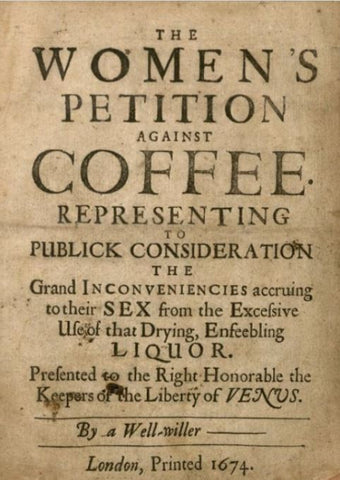
When Women In London Tried To Have Coffee Banned
Throughout history, individuals and groups have petitioned relentlessly to have offensive or dangerous items banned. For example, alcohol, poisonous lead used in makeup and certain kinds of drugs. Mostly things that do harm to the consumers of these products and the society where they’re consumed or used.
There have also been bans called for on rather unusual items like low slung pants in Virginia or Mussolini banning ice cream in Italy in the 1940s because it was ‘too American’.
One of the strangest petitions ever was when the women of London rallied together in 1674 to ban coffee. In London in the 1660s, coffee houses became popular destinations for men to socialise, drink coffee and talk about literature and politics. Back then, you couldn’t share a snappy meme on Facebook to spread your political messages, you needed to wander the streets and find a coffeehouse whose clientele aligned with your values. King Charles II actually tried to have coffeehouses abolished as he didn’t like the idea that people were gathering together to talk about politics. As it turns out, the wives of these coffeehouse obsessed men weren’t happy about it either. Many coffeehouses had female staff but no woman who wanted to protect her reputation would be caught dead in a coffeehouse. This meant men would 'escape' their family duties and spend days on end in these women-free establishments and their wives weren't having it. So in 1674 the Women’s Petition Against Coffee was published and circulated around London.
The manifesto claimed the ‘Newfangled, Abominable, Heathenish Liquor called COFFEE’ caused the ‘Decay of that true Old English Vigor’.
In modern language, they basically wanted coffee and coffeehouses banned as they believed the consumption of the beverage caused a change in male behaviour. According to the wives of the men who frequented coffeehouses, they were rendered impotent, effeminate, useless and lazy after extended consumption of coffee. Discussing ideas instead of partaking in manly tasks as they used to. In order for women to take back the brawny men they married, they would need to have coffee and coffeehouses banned as they ‘provided in times of domestic crises when a husband should have been attending to his duties at home.’
Unfortunately for the women (but fortunately for the rest of us) the Women’s Petition Against Coffee was largely ignored and England became a country of seasoned coffee drinkers. Coffeehouses are also responsible for many of the great works of literature and science. It wasn’t unusual to see dissections of animals being performed in coffee houses or great writers and poets penning some of the greatest words in history.
As amusing as the Women’s Petition Against Coffee is, looking back on it in modern times, the UK can be very thankful that particular petition was never passed.

